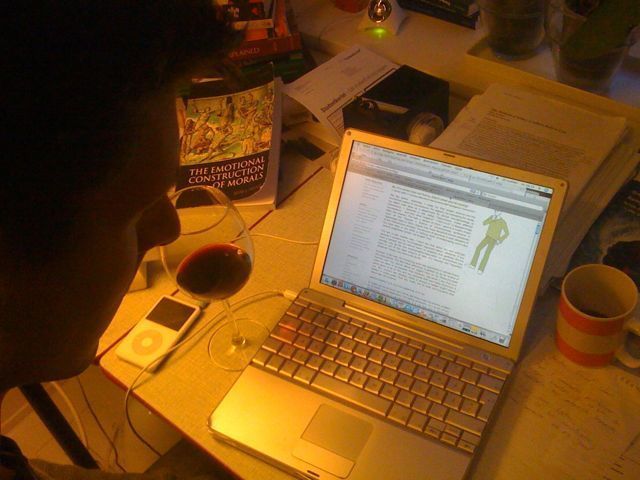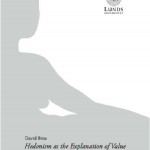Pleasure is very good indeed
7 januari 2010 | In Hedonism Meta-ethics Self-indulgence | Comments?Hardly anyone denies that pleasure is good. ”Because it is pleasant” is an excellent answer to the question ”why do it?”, even if some people find it a slightly to self-indulgent one. But so what? Pleasure is good, but so are a lot of things. Justice is great. Knowledge is just excellent. Excellence to has a lot going for it. And True Friendship and Self-knowledge and Health and Success are all good. At least we talk as if they are, and a good theory of goodness, or of any common sensical concept, should respect the objects that we group under the term that expresses that concept. Right?
If we respect our actual evaluations, then, something like pluralism seems to be right.
We could perhaps think up a concept that would cover the things we usually value, and such a concept would probably chime well with our ordinary language (good luck finding such a concept that cover an uncontroversial set of things, however). But when I say that Pleasure is Good, I say something slightly different from when I say that friendship, knowledge or excellence is good. Pleasure has some more intimate relationship to goodness than any of those things. Pleasure is not only one of the things that we value, it is the basic means by which we value. To experience pleasure is already to pass an evaluative ”judgment” on whatever object that happens to be saliently in our mind at that moment.
I believe this means that pleasure should be given a foundational role in the theory of value. The value that accrues to it is much more fundamental than the ”value” we might want to assign to other objects. The scope of the common sensical concept ”value” has probably evolved to extend beyond its humble origin in hedonic processes, but its origin is still relevant to that concept. Pleasure, I say, is not only good, it is very good indeed.
changing preferences
2 januari 2010 | In parenting Self-indulgence | 4 CommentsA number of things are said to happen when you become a parent. One of these is the curious event of changing preferences: an unprecedented, radical and rather immediate switch in interests and priorities which, so it is said, is impossible to imagine beforehand. The last bit is usually added by people who are already parents, and with more than a detectable hint of smugness. This smugness is earned by not sleeping very well.
(Topic for an another blogpost: the inflated case for first-hand experience. When people say things like ”you had to be there” I often react ”Well, then you must not be telling it very well”. Not to their face, obviously. Also: don’t say ”this town is too small for me”, it has the metaphorical implication that you are in some important sense bigger than the people for which the town in question is not too small. Rather, say ”I’m not capable of flourishing in this environment”. Or, come to think of it: don’t say that either. You might get a short, sharp visit from the smack-fairy).
What’s interesting about changing preferences is that they muck rational decisions up a bit. If a travesty of the classical model of a rational person is correct, and a rational person is one who acts in accordance with his/her preferences: How can we make the decision that involves changing those preferences rationally? What preference is satisfied by my creating new preferences? It might be a meta-preference: for having preferences that are more easily satisfied, for instance. If you have a preference for chinese food, and there is no good place for chinese food where you live, and you wont move (what? I question your devotion to chinese food, sir) there is a case for you giving up on this preference. At least if you take the preference to be contingent on its own existence, i.e. if there are no preference independent reasons to care for chinese food.
If the change in preferences brought about by having a kid is radical and unforeseeable, it becomes even more difficult to make the decision rationally: you don’t know whether the preferences created will be easy to satisfy, nor what they will involve when it comes to changing your preferences for things that you know genuinely care about. In fact, you might even loose the preference (meta- or not) that made it seem like a rational decision in the first place.
Comparable decisions are to start caring about a sports-team or to use drugs. In particular the latter is comparable, since it has a tendency to consume other preferences. (The drug case is different insofar that it is very rarely a good idea).
What adds complexity to the child-case is that not only do you change your own preferences: you create a new subject of preferences and those are in a very real sense unpredictable in the long run.
Let the record show that so far, there has been a clear net gain in preference satisfaction, notably among the unforeseen ones (such as rekindling my interest for preference changes), and a non-significant loss of previous, important ones.
december is the blackest month
23 december 2009 | In Alice Self-indulgence | Comments?When we were first dating, my wife to be gave me a box of home-made fortune cookies with personal messages (one of them suggested that I should get a drivers license. Five years later, I finally got around to it. Another simply said ”Heart of Gold, Brain of Jam”. She was on to me at the start). A stream of thoughtful, witty and useful gifts later (she converted me to mac, for instance), the beginning of december brought around one of the nicest yet: the Liquorice Christmas Calender.
I’ve gone on record declaring my devotion to liquorice, listing it as one of my main sources of pleasure. I also have a thing for weekday-labeled socks. Alice combined these two things so that each day of december, there is a weekday sock stuffed with delicious liquorice of some variety I haven’t tried before. All have been interesting, and has helped me define my preferences, and some have been just fantastically good eatin´.There is a specialist shop Stockholm which I have yet to visit, but when I do, I now know just what to look for. (I think I’ll wait a bit, though, making january ”liver failure awareness month”).
I try to reciprocate, of course, and hope to have covered some distance by dedicating my dissertation to her.

Calender of socks

The Liquorice Stuffing
when does it get interesting?
17 december 2009 | In Moral Psychology parenting Self-indulgence | 2 CommentsWe just returned home with our newborn child, who shall remain nameless (but not for long). And, in a very Carrie-like trope indeed: it got me thinking. (Carrie of New York single life fame, not the gym-hall massacre one. Or the one hilariously falling over in the opening credits of ”little house on the praire”): At what age does a human being get interesting? Every now and then I come across opinions, and decided preferences (and you know those interest me no end), in this matter. Most frequently the (faux)controversial opinion is that kids are tedious and uninteresting at least up until the point they develop thoroughly thought through political views and a natural distaste for their parents. Also, they should be able to help you with your computer.
Others require less. Capacity for speech, for instance, and some creative thinking/acting to boot. This preference is guided by wanting a human being to be treatable as an equal, and the relevant equality is one of thought, rather than of bowel movement or need for constant attention. Four-year olds will do for these people. There is a trend in moral psychology to make a big deal out of the stage where kids start to distinguish conventional from non-conventional wrongs, which is usually a bit earlier still and that certainly is an interesting age.
Infants, on the other hand, are often perceived as poop/sleep/crying machines that have the mild added value of smelling quite nice. (Young, single intellectuals – the group I’ve spent the larger portion my life belonging to, and thus have some inside knowledge of – have a hard time realising how they could possibly enjoy the company of, and thus care for, people of this miniscule sort.) They may be cute, and they may evoke some positive emotions, but interesting? Not as such.
I beg to differ (from the people I just kind of made up). Infants exhibit complex behaviors, and while it might seem random beyond the bare essentials, learning does takes place. The study of infants needs to take into account what they actually control. One particular interesting study used the baby’s ability to change the speed with which it sucked on a pacifier to reveal its preferences. We don’t need to assume fullblown intentions in order to identify interesting behaviors and the beginning of individual differences. To me, at least, the Little One has been interesting from the start.

One might, but I wont
8 november 2009 | In Meta-philosophy Self-indulgence | Comments?I consider banning the phrase ”one might argue that…” from all my future writings. Since these writings have a better than average chance of being writings in philosophy, this ban would be the equivalent of Perec’s ban of the letter ’e’ from that novel you know you ought to have read already.
You see, it’s such a useful phrase, and it rids you of all responsibility for anything that follows. No referee, however anonymonous, is likely to insert the comment ”no, one might not”. Since philosophy consist to such a large extent of stating propopositions to which one does not assent, dispensing with this trope is perhaps masochistic of me, and might well prove near impossible, but I believe it would be an improving exercise.
Lecturing in the shower
30 oktober 2009 | In Meta-philosophy Moral Psychology Self-indulgence | Comments?I don’t sing in the shower. It’s not that I don’t sing Period, I will join in when people let me and have even been known to attempt the occasional added fifth or fourth or thereabouts. It’s just not a shower thing. I do, however, prepare lectures in that setting. Trying out how they sound and so on. Thinking is usually a rather unstructured, associative affair, and even writing these post-typewriter days has lost some of it’s definitiveness (as these rather freefloating associations of mine amply demonstrate), but Thinking Out Loud helps getting the clarity and simplicity required for getting the ideas across. Just ask the neighbors in the poorly soundproofed apartment next to ours.
Afternoon wine
27 oktober 2009 | In Self-indulgence | 2 CommentsThe notoriously reclusive philosopher D Brax has recently granted a few interviews to a select number of magazines. Being that Pynchonesque creature, I can tell you, means that I’m not that accustomed to dealing with photographers, and their various means of conveying meaning. Thus I found myself quite perplexedly (is that a word? Let’s go ahead and pretend it’s a word) holding a glass of red wine in the middle of the afternoon. You see, this being a wine magazine, holding said receptacle while smiling would somehow get the message across. The perplexedness (word? Let’s say it is) has yet to subside, as you will no doubt see yourself from this picture. Amazingly not a montage.
So, it’s correct but not funny, that’s what you’re saying?
11 oktober 2009 | In Comedy Meta-ethics Neuroscience Self-indulgence | Comments?The day before yesterday, I made my first proper venture into the unchartred waters of neuroscience. For reasons too interesting for words, my debut took place at a department for clinical neurophysiology in Gothenburg. I delivered a talk called ”Value-theory meets affective neuroscience – and then what happens?”. (”Not much” is disappointingly often the answer). This talk, a version of which I gave to a mostly empty room at the Towards a Science of Consciousness conference in Copenhagen back in 2005, argues that these disciplines should colloborate of key motivational concepts. The amount of ignorance in each discipline of the work done in the other is nothing short of embarrasing, and in dire need of rectification (enter: not so petit moi).
The talk is also notable (yes, I think like that about my own writings) because it contains my ”no-Cinderella” argument about reference: If you have a concept but no natural event or property that perfectly fits the concept, you go for the event/property/step-sister on which/whom you have to cut of the least amount of toes. It’s basically the ”imperfect derserver” theory, but more cute, by far.
Anyway: in the talk, I’m intrducing some key arguments in ethical theory and meta-ethics. The fact-value distinction is backed up by an outline of Hume’s Law: You cannot derive an ’ought’ from an ’is’. There are cases when we seem to do precisely this, however. Like when I say that your pants seem to be on fire, and you conclude that your really should put it out. But, Hume’s law dictates, there is always a hidden ’ought’-clause hidden in these cases. That you ought not to wear burning pants after labour-day, for instance.
Hold for laughs 2-3-4. It is not happening, is it? No.
It might not be as funny as I think, but there might be another problem to, to which I cling desperately: I’m talking philosophy to a bunch of non-philosophers, and for a non-philosopher, it is not that easy to distinguish the jokes from the real thing.
Who likes short shorts?
26 september 2009 | In Hedonism Meta-ethics Naturalism Self-indulgence Uncategorized | 2 CommentsLately, the question ”what is your dissertation about” has become somewhat more frequently asked of me. Forthy-five minutes later, I usually get the impertinent question if I’d mind making the answer a bit shorter. Well, I do mind, but allright. So I end up experimenting with different short-versions, none of which is unqualifiedly true. But then again, to be unqualifiedly true is pretty much to ask of any theory. After all, my argument is that hedonism is true enough. Anyway: I’d thought I’d give it another go, and to give you in less than, say 200 words, the gist of my theory of value. Ready? Here we go:
What’s good? Opinions diverge, so we turn to the more basic question: What do we say when we say that something’s good? What would make that statement true? Theories are wildly at odds with each other. What to do? It seems we are dealing with different uses of the term ’good’, and we must decide how to treat this problem. The first decision is to look for their common origin, so we can say that these uses are variations on a common theme. The other decision is to treat goodness as a natural property.
Whatever value is, it must correspond to what we believe about it. We might be mistaken about it, but cannot be totally wrong. Value should fit with our beliefs about value and be part of the causal explanation of those beliefs. I argue that pleasure fits with many of our value beliefs, especially regarding how value relates to motivation, and it is universally believed to be valuable. Hedonic processes, are also a key part of the causal explanation of our evaluations, and evaluating abilities. This means that the common beliefs that the theory does not make true, it can explain away. Pleasure is value.
How did I do?
Post Doc Posts Document
15 september 2009 | In blogg-launch Hedonism Self-indulgence | 2 CommentsSay you’re interested in the nature of pleasure. Say you’ve harbored hedonistic inclinations all of your life, but haven’t really found a version of that theory that really fits with your empiricist life-style. Say that you find meta-ethics absolutely hilarious and the publishing industry just can’t turn out books on the subject fast enough for you. Quite besides the obvious fact that you and I should be friends, (Facebook friends at least – all the information, none of the guilt for not calling, or caring, really), here is something you might be interested in.
It’s my dissertation, ”Hedonism as the Explanation of Value”, which I (successfully, I might add) defended in Lund, Sweden on Saturday the 12th of september.

